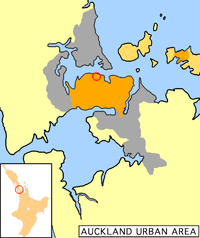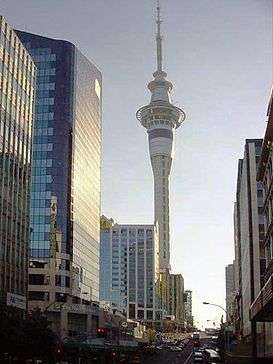Auckland City
| Auckland City | |
|---|---|
| Territorial authority of New Zealand | |
|
Auckland City's location within New Zealand | |
 Auckland City: Orange areas area show the city's area within the greater Auckland conurbation's urban area (grey). The city centre is ringed. Note that the city also encompasses islands of the inner (upper right) and outer Hauraki Gulf. | |
| Country |
|
| Region | Auckland |
| Seat | Auckland CBD |
| Government | |
| • Mayor | Len Brown (see Auckland Council) |
| Area | |
| • Total | 637 km2 (246 sq mi) |
| Time zone | NZST (UTC+12) |
| • Summer (DST) | NZDT (UTC+13) |
| Area code(s) | 09 |
| Website | www.AucklandCity.govt.nz |

Auckland City was a former local authority district covering the Auckland isthmus and most of the islands of the Hauraki Gulf, in the North Island of New Zealand, which was governed by the Auckland City Council. On 1 November 2010 the council was amalgamated with other councils of the wider Auckland Region into the new Auckland Council. Auckland City was the most populous city in the country, with a population of [1] at 30 June 2010. It lay in the Auckland Region, which was governed by the Auckland Regional Council based in Auckland City.
Auckland City was, together with its neighbouring cities, part of the Greater Auckland area. As the term 'Auckland' may have referred to the local authority alone, to the whole metropolitan area, or even to the broader region, this may have led to ambiguity, since people from other parts of New Zealand or from overseas often did not draw any distinction; especially now that the metropolitan area has been amalgamated. In 2009, Auckland was rated the fourth-best place to live in the world, in human resources consultancy Mercer's annual survey.[2]
Geography
The mainland part of Auckland City lies on an isthmus. The Waitemata Harbour, which opens to the Hauraki Gulf, separates the isthmus from North Shore City and north. The Manukau Harbour, which opens to the Tasman Sea, separates the isthmus from Manukau City and the south. The distance between the two harbours is particularly narrow at each end of the isthmus. At the western end, the Whau River, an estuarial arm of the Waitemata Harbour, comes within two kilometres of the waters of the Manukau Harbour on the west coast and marks the beginning of the Northland Peninsula. A few kilometres to the southeast at Otahuhu, an arm of the Hauraki Gulf on the east coast comes just 1200 metres from the Manukau's waters. Being part of the Auckland volcanic field, much of the isthmus is mantled with volcanic rocks and soils, and several prominent scoria cones dot the isthmus.
Many Hauraki Gulf islands are part of Auckland City. The islands of the inner gulf include Rangitoto, Motutapu, Browns Island, Motuihe, Rakino, Ponui and Waiheke, while the outer gulf islands include Little Barrier, Great Barrier and the Mokohinau Islands.
A significant portion of Auckland's CBD and of the Auckland waterfront is built on land reclaimed over the last 100 years. Substantial development of such under-utilised areas to the west of the CBD has been projected, with large businesses beginning to relocate there as of 2006.
On 15 August 2011, a light snow fell in Auckland city around 2:40pm and lasted around fifteen minutes.
Structure
Governance
In November 1989, central government restructured local authorities throughout New Zealand. After substantial protests and legal challenges, Auckland City was merged with eight smaller local authorities to form a new Auckland City Council. The new Auckland City had double the population of the old. However, amalgamation, forced onto local authorities often against their will, was criticised to have led to less democracy and higher rates for the same services.[3]
A further restructuring and amalgamation brought all seven councils in the area and the Auckland Regional Council into one "SuperCity" Auckland Council, starting 1 November 2010.
Coat of Arms
The City of Auckland has a coat of Arms emblazoned as; Argent, upon waves of the sea a two-masted ship in full sail proper flagged Gules, on a chief per pale Azure and Gules to the dexter a Cornucopia Or, to the sinister a Shovel surmounted by a Pick, in Saltire proper. Crest: Issuant out of a Mural Crown Or a representation of the Phormium Tenax flowered proper. Supporters: On either side an Apteryx proper. Motto: Advance.
What it means. Firstly the shield is described. Argent means silver so the shield is silver. “upon waves of the sea a two-masted ship in full sail proper flagged Gules” means that a two masted ship is depicted on the sea. It in full sail, and “proper” means it is depicted in its natural colours. “Gules” means red so the ship has a red flag on it. The next part of the shield is then described. A “chief” is the broad strip at the top of the shield. “Per pale” means the chief is split into two parts by a central division. “Azure” means blue so the first part is coloured blue and the other part is red. “On the dexter” is the right side of the shield from the view of the shield carrier but to left for a viewer. Then the object on this part of the chief is described. A Cornucopia is shown and its colour is “Or” which means gold. On the other side of the chief (sinister, right side for a viewer) is a Shovel. On top of this (“surmounted”) is laid a Pick and “in Saltire” means that they are crossed X fashion. Again “proper” means these two objects are shown in their natural colours. The crest is then described. The “Mural Crown” means a crown made from masonry or bricks and its colour (Or) is again gold. From this crown sprouts New Zealand Flax (Phormium Tenax) in flower. Proper again means it is shown in it natural colours. The Supporters are the creatures on either side of the shield and in this case they are Kiwi birds (Apteryx) in their natural colours. The motto sits under the shield. The mantling and helmet are not usually described in the blazon and the depiction of these is normally left to the heraldic artist to decide.
Population
Auckland is the largest and most cosmopolitan city of New Zealand, and in 2010 it was made up of 188 ethnic groups, making it New Zealand's most diverse city, and slightly more diverse than in 2007, when 185 ethnic groups had been counted.[4][5] In 2010, the life expectancy was 83 years for women, and 79.6 years for men, while the average age of the population was 33.4 years, with 35.9 years for the country.[4]
Lifestyle
While Auckland suffers from the usual issues associated with any large city, it has recently made some inroads against crime, with the period from 2007 to 2008 showing a drop in crimes reported of 4%, while nationally, there was a 1.2% rise. The reduction was mainly attributed to more night-time police patrols and stricter procedure against liquor-ban breaches and similar offenses, with the "disorder" offences (often related to alcohol) dropping 14.4%.[6]
Economy

In the year to March 2009, Auckland City had 353,000 jobs, of which 26.3% was held by property and business services,[7] as well as 65,655 businesses, making up 13.1% of New Zealand's businesses and 16.2% of New Zealand's jobs.[8] Over 2009 to the month of March, Auckland City's unemployment rate increased to 5.6%, compared to the overall New Zealand unemployment rate of 4.5%. In addition the city's economic output declined by 2.4%.[7] Gareth Stiven, the economic manager of Auckland City, stated that this was because the city's economy was heavily involved with service industries, such as banking and insurance, which were affected by financial crises.[9] However, over the last five years of its existence, Auckland's economic growth averaged 1.4% each year, higher than the average of the region and the nation.[4]
As of 2003 three of the ten largest companies in New Zealand (Air New Zealand, Fletcher Building, and Foodstuffs) were headquartered in Auckland City.[10] Many large corporations were housed within Auckland CBD, the central part of Auckland City.[10]
Air New Zealand has its worldwide headquarters, called "The Hub", off Beaumont and Fanshawe Streets in Western Reclamation, Auckland City;[11][12] the airline moved there from the Auckland CBD in 2006.[11] In September 2003 Air New Zealand was the only one of the very largest corporations in New Zealand to have its headquarters within the Auckland CBD.[10]
Lists
Suburbs
These lists of suburbs are arranged electorally, by the Wards, starting from the west:
- Avondale-Roskill
- Avondale, Blockhouse Bay, Lynfield, New Windsor, Hillsborough, Three Kings, Waikowhai, Mount Roskill, Sandringham, Wesley, Waterview
- Eden-Albert
- Balmoral, Morningside, Mount Albert, Mount Eden, Owairaka, Kingsland, Sandringham, Waterview
- Western Bays
- Grey Lynn, Newton, Western Springs, Point Chevalier, Westmere, Ponsonby, Herne Bay, Freemans Bay, Saint Marys Bay.
- Hobson
- Auckland CBD, Epsom, Greenlane, Newmarket, One Tree Hill, Parnell, Remuera, Mechanics Bay, Grafton, Newton.
- Eastern Bays
- Mission Bay, Kohimarama, Saint Heliers, Orakei, Glendowie, Meadowbank, Saint Johns
- Tamaki–Maungakiekie
- Glen Innes, Point England, Tamaki, Panmure, Mount Wellington, Ellerslie, Otahuhu, Westfield, Southdown, Penrose, Oranga, Te Papapa, Onehunga, Royal Oak, Stonefields
For the suburbs of the other cities within the Auckland urban area, see North Shore, Manukau, Waitakere and Papakura.
Education
Twin towns – Sister cities
Auckland City has six sister cities and two friendship city relationships. All of these cities except Hamburg (Germany) are located around the Pacific Rim:[13]
|
Media



See also
References
- ↑ "Subnational population estimates at 30 June 2010 (boundaries at 30 June 2010)". Statistics New Zealand. 26 October 2010. Retrieved 19 December 2010.
- ↑ Mercer — Quality of Living global city rankings 2009: Mercer survey, 28 April 2009
- ↑ Thompson, Wayne (6 September 2006). "Lessons from the history of local body amalgamation". The New Zealand Herald. Retrieved 17 September 2011.
- 1 2 3 "Report looks into the state of our city". CityScene. Auckland City Council. 29 August 2010.
- ↑ "Keeping Auckland's Future Bright: Auckland City Council Annual Report Summary 2006/2007" (PDF).
- ↑ "Booze crackdown reduces crime", The New Zealand Herald, Thursday 2 April 2009, Page A1
- 1 2 "Auckland business and economy report 2009." City of Auckland. Retrieved on 15 September 2009.
- ↑ Eriksen, Alanah May. "Optimistic outlook for city economy." The New Zealand Herald. Tuesday 19 August 2008. Retrieved on 7 September 2009.
- ↑ "Auckland's economy drags but recovery on way." TVNZ. Friday 14 August 2009. Retrieved on 7 September 2009.
- 1 2 3 "The Economy of Auckland’s Central Business District." City of Auckland. September 2003. 10 (20/77). Retrieved on 7 September 2009.
- 1 2 Gibson, Anne. "Air NZ readies for headquarters shift." The New Zealand Herald. 14 August 2006. Retrieved on 26 August 2009.
- ↑ Taylor, Colin. "Big piece of Viaduct for little guys." New Zealand Herald. Saturday 21 October 2006. Retrieved on 5 March 2010.
- ↑ International partnerships (from the Auckland City Council website. Retrieved 2006-10-07.)
- ↑ "Guangzhou Sister Cities[via WaybackMachine.com]". Guangzhou Foreign Affairs Office. Archived from the original on 24 October 2012. Retrieved 2013-07-21.
- ↑ Orsman, Bernard (2 March 2007). "Oops! Sister cities cost an extra $150,000". The New Zealand Herald. Retrieved 2007-05-24.
- A Complete Guide To Heraldry by A.C. Fox-Davies 1909.
External links
| Wikivoyage has a travel guide for Central Auckland. |
- Auckland City Council website, the local authority for Auckland
- History of Auckland City by Graham Bush
- Heart of the City website by the Auckland CBD business' association
- Heritage Walks: The Engineering Heritage of Auckland, historic text, 360° panoramas and heritage imagery accessed through an interactive map
| ||||||||||||||||||||||
Coordinates: 36°52′23″S 174°45′18″E / 36.873°S 174.755°E